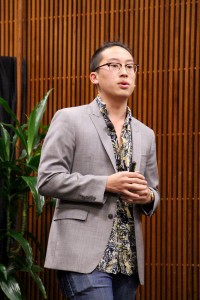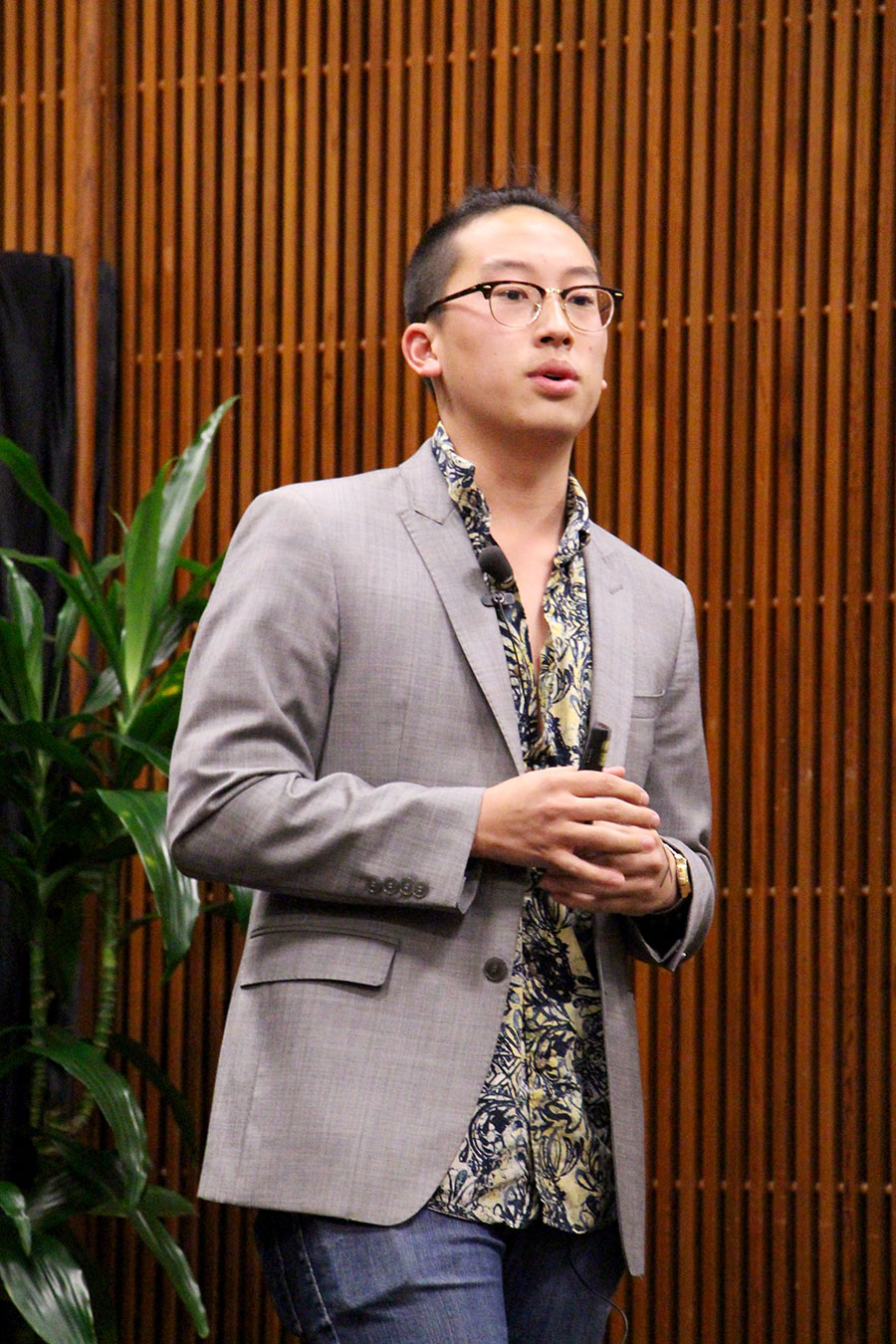Tommy Talks features student ideas in first event
Tommy Talks hosted its first event in the Annenberg Innovation Lab Saturday night featuring talks by Michelle Lau, Alex Zhang, Logan Heley and Ariel Sobel.

Expand your mind · Alex Zhang, a sophomore majoring in business administration, was one of the four Tommy Talks speakers. His talk focused on the creative benefits associated with lucid dreaming. – Zhiliang Zhao | Daily Trojan
Tommy Talks was founded last March, and students have been planning the kickoff event since then. Anne Kennedy is the executive director of the program and has taken the lead in establishing and planning Tommy Talks.
“I love TED Talks,” she said. “We’re not exactly like them — we’re very unique in our own way — but that’s kind of the inspiration.”
The event included four talks on diverse subjects ranging from pornography to politics. The goal is to bring together different leaders on campus to spread their ideas to students whom they wouldn’t normally be able to reach.
“I just wanted to give a platform for students to speak about their interests in an easy way online so students who can’t come to the event today can still get to see, and if they’re interested, reach out and connect in ways they haven’t yet at USC,” Kennedy said.
The planning committee for Tommy Talks has eight executive teams to help prepare for the event. Students on the teams come from all parts of the school, including at least one from each undergraduate school at USC.
“We have such a diverse representation and different ideas coming that it’s really been awesome,” Kennedy said.
For this event, Tommy Talks selected the speakers. For future events, though, students will be able to apply online to give a talk.
The first speaker, Michelle Lau, is a senior majoring in business administration. Her talk focused on the effect that the porn industry has on both self-image and relationships and the need to be aware of the kind of media people consume.
“Porn has hijacked our sexuality,” Lau said.
The second speaker, Alex Zhang, is a sophomore studying business administration. His talk, “Expand Your Mind: Lucid Dreaming 101,” centered on the concept and benefits of lucid dreaming.
“My friends know me as the lucid dreamer,” Zhang joked. “I used to do school projects on it all the time. It works for everything: psychology, philosophy, biology.”
Zhang discussed the positive impact lucid dreaming has on creativity, citing the movie Inception. He also referenced director James Cameron and artist Salvador Dalí, who have both credited lucid dreaming with some of their best ideas.
The third speaker, Logan Heley, a senior majoring in broadcast and digital journalism and history, made the argument in his talk that the American political system isn’t, as many people think, broken. He also stressed the importance of Americans, particularly college students, voting in November’s midterm elections to ensure that young voices are heard.
“What if, instead of extremism from the right or extremism from the left, we as voters demanded extremism from the center, the people willing to compromise?” he asked.
Though Heley’s talk focused on a serious topic, he often used humor to make his points.
“It’s no lie that Congress is not popular,” he said. “They’re less popular than cockroaches, Nickelback and traffic — which in L.A., is hard to believe anything can be worse than.”
Ariel Sobel, a sophomore majoring in writing for screen and television, gave the final talk. She is a spoken word poet whose writing has been published in the Huffington Post and recognized by two Poet Laureates.
Sobel referred to herself as “an emotional nudist.” In her talk, she emphasized the importance of emotional vulnerability and openness, particularly for college students.
Daniel Musa, a senior majoring in international relations, attended the event and said that he hopes to be able to give a talk in the future.
“I think the toughest part, for me, would be finding a topic that I feel engaged in and that I feel like other people would want to listen to,” Musa said. “[But] I would absolutely be down to do a talk.”
He said that other colleges should follow suit in creating similar events on their own campuses.
“I actually think this is something that should totally be replicated on other college campuses, even in K-12 education,” Musa said. “I think this sort of forum really empowers students to feel passionate about something and to advocate for it.”
The talks will be posted online for further viewing.

